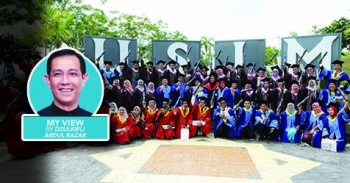USIM paves the way
Professor Tan Sri Dato' Dzulkifli Abdul Razak
My View - The Sun Daily
March 15, 2017

LAST week, Universiti Sains Islam Malaysia (USIM) was honoured to be designated as The King Salman Centre for International Peace.
It befits the raison d'être of the university as a faith-based institution to promote peace and deeper multi-faith understanding.
Thanks to the generosity of the Saudi government, the centre will allow the university to play a greater role to move forward the peace-making and sustaining process in all fields of endeavour which is knowledge-based.
Last week, USIM also saw the launching of a unique Japanese Language and Cultural Centre as part of its outreach to the globalised world.
The centre was officiated by His Excellency Dr Makio Miyagawa (pix), the ambassador of Japan to Malaysia, who lauded the initiative to further bridge the Malaysian and Japanese communities.
This is markedly so as this year is the 60th anniversary of the diplomatic links between the two countries. The centre boasts a specially crafted cultural "lab" where students can reinforce their use of Japanese within its cultural context. The support of the embassy and other related agencies is gratefully acknowledged.
Indeed, last week was a (re)defining one for USIM following the vice-chancellor's annual address to the university outlining the new aspiration for 2017 and beyond.
Following through the higher education minister's address on Redesigning Higher Education in January, Prof Datuk Musa Ahmad articulated the vision of how USIM could be aptly "redesigned".
Not deviating from its raison d'être, some 16 years ago as a public university, and even longer as a faith-based institution, he proposed the "Kampus Barakah" vision. It serves as a platform to integrate key "knowledge" concepts in a holistic way to convey "barakah" as the ultimate outcome of a faith-based academic institution where knowledge is held supreme.
In the Quran the term "barakah" appears more than 30 times to denote "blessings" in various context of doing good deeds and prohibiting bad or evil ones. Indeed this is ultimately the higher purpose of education namely to evolve the "balanced" person (insanul kamil) above all, in nurturing a "harmonious" global community.
Although this message may have been somewhat blurred by other myopic
agenda, the National Philosophy of Education (NPE) continues to serve as a keen reminder when it advocates that the Malaysian education is to nurture "a balanced and harmonious" human person and (global) citizen.
It is no coincidence that the first proposed shift in the Higher Education Blueprint (HEB, 2015-2025) refers to "Holistic, Entrepreneurial and Balanced Graduates". In other words, the
"Kampus Barakah" initiative is directed to rekindle the fading spirit of NPE at the same time meeting the aspiration of the blueprint.
This can be realised via three interrelated approaches. First by embedding the culture of iqra' (meaning: read or recite) as in the first commandment to the Prophet of Islam, Muhammad (pbuh) in the Quran.
The commandment lifted iqra' as a moral duty in seeking truth and justice that is entrusted to the "learned". This also means that the scope is not confined to any single area of study, rather transdisciplinary in nature as heralded by scholars of yesteryears especially during the era of Muslim civilisations.
Not only is the knowledge well integrated and convergent for the benefit of humanity as its "translational" outcome, it is also sustainable to meet the needs of the day and the future without taking a toll on the ecosystem.
Incidentally, iqra' is the very word encountered at the university's main entrance to welcome the university community and visitors alike.
Implicit in this is the "integration" of revealed and human "generated" knowledge in nurturing the "balanced and harmonious" human person as per the NPE. This is more apparent from one of the six student aspirations, ethics and spirituality.
In the HEB it is described as "graduate with a balance of akhlak (character) and ilmu (knowledge)" that better prepares them … in "grappling with the complexities and new challenges of the 21st century".
In the final analysis, it demands a different perspective in (re)defining where the intellectual seat is. Here the role of the "heart" is vital taking into account various sources of wisdom such as Aristotle:
"Educating the mind without educating the heart is no education at all". Or as Einstein cautioned: "We should take care not to make the intellect (mind) our god. It has, of course, powerful muscles, but no personality. It cannot lead, it can only serve."
Indeed, a 2014 Unesco document urged that "the concept of education ... has to change radically. Education has to move away from being an exercise with an end goal of transferring skills to a socio-emotional praxis, that is the education of the heart. These are in line with faith-based teachings promoting similar wisdom which is now marginalised.
Education as we know it needs to be "redesigned" to bring to life yet another profound quote: "The heart of education is education of the heart". On this USIM is spot on to redesign education.
